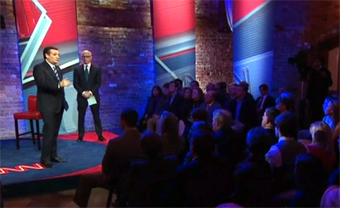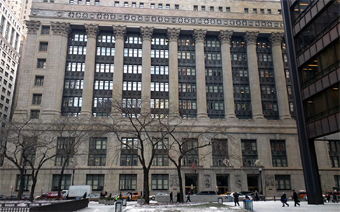
Image courtesy of Cook County, Illinois
Question of Cruz Eligibility to be
Heard in Chicago Court
| published February 19, 2016 |
By Keith H. Roberts, Thursday Review
Questions over the eligibility of Texas Senator Ted Cruz to serve as U.S. President may be proceeding through the courts in a surprising way.
Despite GOP front-runner Donald Trump’s frequent threats to sue Cruz in Federal court, it is neither Trump nor the feds who may be pushing the legal challenge forward, but a Chicago attorney whose previous legal objection—which was dismissed by a board of elections mediation office in Chicago—may now be heard by the Circuit Court of Cook County in Illinois. The Circuit Court has already agreed to hear the case, though it is not clear that the Illinois challenge will impact Cruz’s national candidacy.
Cruz’s eligibility has already been challenged three times in three unrelated jurisdictions. Each of those cases or legal challenges has been dismissed. Three more challenges are currently pending in other states or cities.
The case now pending before the Cook County Circuit Court, however, could have deeper implications—especially if it triggers a wider move by the state to strike down Cruz’s eligibility in a heavily-populated state. If Illinois decides on its own that Cruz is not eligible under the U.S. Constitution, Cruz—even if he wins the Republican nomination—may be unable to have his named placed on the ballot in the Land of Lincoln.
Trump has repeatedly threatened to take the issue of Cruz’s eligibility to court, but his threats have ramped up as late in response to several negative campaign ads which the Cruz team is running in South Carolina and other upcoming primary states. Trump and Cruz are now locked in a close battle for the title of front-runner. A new NBC News/Wall Street Journal poll shows Cruz slightly ahead of Trump nationally; however, recent CBS News polls and CNN/ORC polls show Trump with a comfortable lead among Republicans nationally.
Front-runner Trump has said that Cruz is not eligible to serve as President or Vice-President by way of his birth. Cruz was born in Calgary, Canada, to an American mother and a Cuban-American father. Cruz’s parents were living at the time in Calgary because of their work as contractors for a U.S. energy company. Cruz has said that because his mother was an American citizen, Cruz himself is an American citizen. The U.S. Constitution states that to serve as President one must be “a natural born citizen,” though legal scholars are somewhat divided on how to interpret that.
Cruz has maintained the support of numerous legal experts to argue that his citizenship is on solid ground, despite Trump’s assertions to the contrary. However, there is a minority of legal scholars in disagreement with that assessment, and suggest that Cruz may, in fact, be ineligible. The question has come up in bitter exchanges in several Republican debates.
Trump has said that the matter of eligibility is a central conundrum for the GOP. If Cruz were to win the Republican nomination next summer in Cleveland, what would happen if a court challenge by Democrats forces his name off the ballot in some, or all, U.S. states? It’s a doomsday scenario some in the GOP prefer not to think about. Still others suggest the matter should be vetted and resolved early, rather than later.
Cruz, for his part, has dismissed the whole thing as a combination of a bitter, enraged Trump—now feeling the heat after losing to Cruz in Iowa, and facing slippage in at least some national polls—and an unkind media, which is looking for the next juicy morsel to feed a hungry battle for readers and viewership.
The suit challenge now working its way through the courts in Illinois started with attorney and pharmacist Lawrence Joyce about a month ago. Joyce, a supporter of retired neurosurgeon Dr. Ben Carson, fully expected Carson to eventually become the serious challenger to front-runner Trump. But any chance of Carson’s ascendancy may have been sabotaged—according to some—by underhanded Cruz operatives in Iowa, some of whom allegedly spread false rumors of Carson’s imminent withdrawal from the GOP race on the very day of the Iowa caucuses. Carson and others have darkly hinted that thousands of votes may have shifted from Carson to Cruz in those hours—a tidal force which zinged Carson and landed him toward the bottom of the pack when the votes were finally counted.

Ted Cruz during recent CNN Town Hall/image courtesy of CNN
Cruz emerged the surprise victor that night, and overnight became what most regarded as the only top tier alternative to Trump for Republicans. Joyce was stunned, and angry. He says he was also concerned that in his single-minded zeal to say anything or do anything to win the nomination, Cruz is deliberately turning a blind eye toward the potential for a more serious, disastrous lawsuit in the fall.
Joyce filed a complaint with the Board of Elections in Illinois, insisting that Cruz’s name be taken off the primary ballot because of Cruz’s Canadian birth. After some discussion, the board concluded that Cruz was eligible based on the nationality of his mother, and added that candidate Cruz need not “take any steps or undergo a naturalization process to become a United States citizen.” It is an argument that Cruz’s legal team has been making all along, not just in public, but in those sometimes thorny hearings and courts.
But Joyce decided to escalate the matter, as is his right under Illinois law, to a higher authority. Now the question will land in front of the Circuit Court in Cook County, which must rule this week on whether Cruz’s name can appear on the ballot.
Joyce’s opposition to Cruz—for whom on the issues and on the whole he may find general agreement—is not based deeply, however, on that stinging and still unpleasant problem back in Iowa (phone calls, social media posts, and text messages telling voters that Carson was dropping out). Mr. Joyce is most fearful of what he sees as the Republican Party’s establishment taking control of the nominating process. In that doomsday scenario, if Cruz is somehow pushed off the ticket after the GOP convention as a result of a major lawsuit, the party’s rules and procedures allow for party officials to reconvene—in a much smaller, tightly controlled venue—to choose a nominee, thus invalidating all the votes of millions of Republicans in scores of primaries and caucuses. It is that classic smoked-filled room which most worries Joyce and his legal allies.
In the meantime, Trump continues to raise the level of the rhetoric, insisting that those negative ads which highlight Trump’s famously fickle positions on issues ranging from abortion to immigration to health care be yanked from the airwaves pronto. The ads, some Trump strategists worry, could dent Trump’s still formidable lead in South Carolina, where voters will soon choose their favorite candidate. On Thursday, Cruz in effect dared Trump to take the matter of eligibility to court—a sort of put-up-or-shut-up challenge which Cruz hopes will knock Trump back on his heels, at least for a few days.
And though many legal scholars agree that Cruz’s legal position seems solid—or at best not on shaky ground—a victory for Joyce’s case in Cook County could trigger both an escalation of the issue, and perhaps even spark copycat legal challenges in a dozen key states. Cruz may win those fights in each one of those courtrooms and hearing rooms, but at what cost to his candidacy, his time, and his resources?
For his part, Cruz says the birther controversy is without merit, and is merely political skirmishes meant to distract from his message. Cruz and his campaign team say they are confident they will prevail in Cook County, as well as in the other jurisdictions where the matter is pending. Joyce wants to fight on through legal channels, but concedes that his limited financial resources may hamstring how far he can take the challenge. He says he would be agreeable to more wealthy opponents—including Trump himself—signing on to his crusade to see Cruz’s name removed from the ballots.
Trump is still threatening to sue the Cruz campaign for those ads now running in South Carolina. The ads use television interviews and news footage showing Trump, in his own words, expressing support for legal abortion, partial birth abortion, same sex marriage, and Obamacare. Trump has said that since he has publicly changed his mind on those positions, Cruz's ad is deeply misleading and crosses the boundary into defamation. Cruz, an attorney with constitutional experience, says that the ads do not meet the criteria of defamation, and said in a town hall event on CNN that he would like to see Trump and his attorneys attempt to make the case stand up in court.
Related Thursday Review articles:
Cruz Leads Trump in NBC News/WSJ Poll; R. Alan Clanton; Thursday Review; February 18, 2016.
Republican Candidates Engage in Explosive Debate; R. Alan Clanton; Thursday Review; February 14, 2016.
